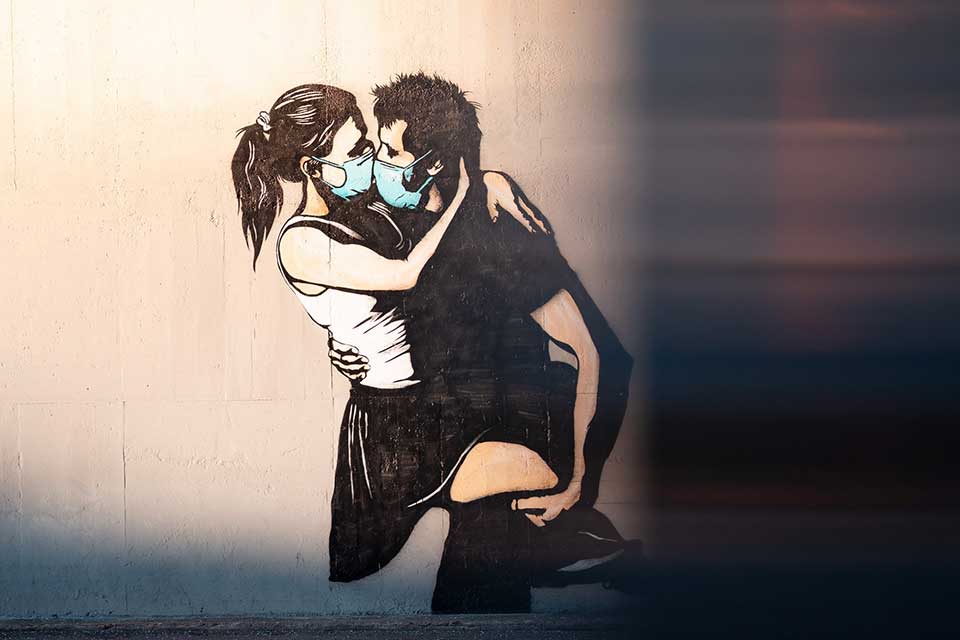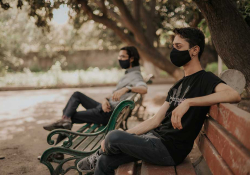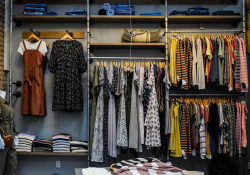Pandemic Love (in 13 Romance Tropes) March 2020–2021

Unrequited love
I download a book. One of those books—for women. Certainly not porn, but you know.
Never mind the shirtless guy gracing its cover (his lumpy, bumpy abs—oh my!), or the wanton splay of the woman draping him like a second, luminous skin. It’s online, so who’s to know?
I bought it on a whim: because of pandemic exhaustion and political brouhaha. Because of stuckness—which, you know, makes sense under the circumstances. Because everything but chocolate tastes gray these days. And no, I don’t have Covid. I’ve tested three times: negative negative negative. Anyway, I barely leave the house.
Still, I miss the wanting, the all-over body shivers that come with desire—for anything at all. Because Netflix? Meh. Puzzles? Eh. Sex? I guess. Breadmaking? Knitting a roof-cozy for the garage . . .
Really? Who’s got such stamina anymore?
And—horror of horrors—for the first time ever, reading has lost its bite. My usual fare: literary fiction for entrée, magical realism for spice, even that old fallback, the sci-fi and fantasy of my teenaged years (call it the candy course). Snore.
As for my old lovers, Ms. Austin and the Brontës—usually good for another spin cover to cover . . .
Nope. Can’t slog past chapter 1.
Then there’s this book, I won’t say its name or author or trope. I won’t bemoan the lackluster writing. It hardly matters. There’s a heroine—pretty as a pearl without a lick of makeup; a requisite, brooding hero endowed with cheekbones like razorblades, a wry twist of a mouth. The book brims with angst and flesh. Somebody burns like the sun for somebody.
Probably. To tell the truth, I mostly skim.
“Whatcha reading?” asks my husband, Steven, peeking over my shoulder.
“Nothing,” I say, snapping shut the iPad’s cover. “Nothing at all.”
Love triangle
“I’m sorry,” I tell Steven. “But I’m leaving you for Cammy the hairdresser. Maybe. I’m still deciding.”
“Huh?”
“Just for a couple hours. Don’t judge. I deserve this.”
“Does Cammy matter more than me?”
I shrug. “I love you like the moon and stars. But I need to feel pretty. It’s winter in Detroit and you know how I get.”
“I tell you you’re pretty.”
“It’s not the same thing. It’s been so long, and I’m dull as a dust cloud. I promise we’ll use protection.”
“But you left Cammy before. Because she gave you stripes that time. And cut you asymmetrical when you said not to.”
I shake my frizzy head. Everything pre-pandemic seems minor now, distant as the sky and just as untouchable. “I’ll talk to her,” I say. “Communication is key. I’ll explain again how I don’t like it that way. Besides, I owe Cammy closure. With lockdown and all, I never even answered her calls.”
Steven sighs. “You cad. Just have the PPE conversation ahead of time. So she doesn’t surprise you by stripping off halfway through. And maybe wear gloves. Because it can’t hurt.”
“I promise,” I say. “It’ll be masks or the highway. And no gloves, no love.”
“It’ll be masks or the highway. And no gloves, no love.”
Amnesia
At 4:30a.m., I get up with Steven before he leaves our bubble house for the sprawling, capricious world. It’s not such a burden, after all.
Over coffee I mention, “I might be forgetting pre-pandemic life. You?”
“I guess,” he says. “Or maybe it wasn’t so different. Because we’ve been lucky.”
True.
I don’t state the obvious, how he and I and our daughter, Celia, lug anxiety like sacks of rocks on our backs, so none of us sleeps well anymore. How, even without the disease riding our blood (like Steven said—lucky), the loss of so, so many humans in such a short period has left us numb, so food and touch and books have lost their umph. So gray skies follow us month after month.
“We had festivals and concerts,” Steven adds. “I miss those.”
“Me too.” How shamelessly we turned our full faces toward the sun. How smiles used to matter.
Still, I already taught online, so little changed there. Steven worked from home for the first months of lockdown, but now he’s back in the classroom, masked and distanced of course. Our sweet Celia, also, recently returned to college, to the dirty house she shares with other girls in her college town where they huddle at their separate computer screens and wait it out like the rest of us. Never mind her nonstop migraines. How every day she calls me, or I call her, and we fuss over her meds and is she eating enough and the slackers who take stupid chances. I don’t mention my almost-appointment with Cammy, since I chickened out at the last minute.
Steven leans in for a goodbye kiss—the perfunctory kiss between the long-married. He grabs a couple clean masks from the stack on the counter and heads out. When he pulls the door shut too hard behind him, it bangs like gunshot, but our pretty house goes on standing. And though the wind’s kicked up a notch, my bricked and stuccoed neighborhood doesn’t crumble to dust. Planes—less of them than before—go on smoke-trailing across the sky. Clouds keep scratching against their gray canvas. Gray on gray.
Ice keeps dropping from the heavens (Steven tosses salt like a champ). Flowers will preen again come summer (I have to believe it).
My lucky little family chugs along on its track. Really, I can’t remember much different.
Ugly duckling
Tomorrow I visit Dr. Alosh in person, for shots in my arthritic knees. It’s been long planned, and I will be vigilant with the PPE. I don’t feel the least bit guilty.
My doctor is tall as a waterfall, his voice deep as the river rocks beneath.
I’m so excited. Never mind the pointy needles to come, how they’ll maneuver like missiles in the oceans beneath my kneecaps (ouch!). Or the whole shaving the legs thing ahead of time (ouch!).
Beneath my masks, I will simper a little—but who’s to know? I will wear real clothes, clean ones at that. The sort that can’t be confused with pajamas. I will brush my fuzzy, graying hair into a perky ponytail and speak in the dulcet registers of my underused looove voice.
As I bare my knobby knees to Dr. Alosh’s perusal, I will swoon like a swan.
Love at first sight
“You can’t go out like that,” I tell Steven when he’s halfway out the door.
“Why not? I’m wearing pants and everything. And I’ve got my mask, obviously.”
“The experts say to wear two masks, now. Because of the variants.”
“Who are these experts?” I shrug. “Does it actually help?”
“Who knows. But do it.”
“All my other masks are wet. Because you said to wash them after every use.”
“Wear one of mine, then.”
“Too small. And, you know, too girly.”
“I bought paper masks. Look. No flowers or anything. You can wear one under your cloth.”
“Are they N95s?”
“The package says 95%. Is that the same thing? I guess you can wear two of them, just to be safe.”
“Along with the cloth mask? You want me to wear three, now?”
“How about top-to-toe Kevlar, or armor to keep the hordes away? Or a space suit complete with dome helmet?”
Steven rolls his eyes, but only a little because he loves me. “By the time this is done, we’ll be strangers passing on the street, nobody recognizing anyone else.”
“No way,” I say. “In this life and beyond, I’ll always know you, Steven.”
Marriage of convenience
Steven brings me coffee most mornings. He weeds the garden in summer and rakes in autumn. I grocery shop, double-masked these days, though I’ve lost the plastic gloves. I use sanitizer till my skin cracks like Arctic ice, and Steven fusses and tells me to moisturize. I read articles to keep us updated and buy Vitamins D and C (and B and zinc and magnesium, which also show promise). And, when Steven and Celia won’t take them, I buy the gummy varieties. Steven empties the recyclables. I make phone calls, to doctors and Costco for tires and to straighten out that one bill that keeps coming even though it’s not our responsibility. Steven’s paycheck covers our mortgage and insurance like bubble wrap. I comfort Celia when she can’t bear one more minute of pandemic. I ask about Steven’s day after he returns from teaching in the alarming outside. He asks about my day teaching online. Steven vacuums. I rub lotion on Steven’s back where he can’t reach. Sometimes one or the other of us cooks. Steven holds my hand on weekend mornings when we lay in bed listening to NPR and drinking coffee. I hold his hand in return. Steven keeps the plants alive. I keep the cats alive. Steven and I keep each other alive.
Regency romance
Before Celia packed her suitcase full of migraine remedies and returned to campus, the three of us settled in bed to binge Bridgerton, that Shondaland extravaganza.
“It’ll be like Pride and Prejudice,” Celia said. “But with new storylines. And color-blind casting. You won’t even have to read, since that’s not your thing anymore.”
We last a few episodes, snuggled together in the blankets with popcorn (Steven), Sour Punch Straws (Celia), tea (me, but the vanilla flavor I save for romantic occasions). On the flat screen, everyone’s beautiful as shooting stars. Ornate and corseted and waistcoated to an inch of their breath. All of them curled and wigged and frilled aplenty. In their English manors, no less, which I can’t help but ogle.
Soon enough, we’re hooked like shiny fish on Shonda’s line. Till the You can touch yourself scene. You know the one I mean.
“Ew,” said Celia looking between me and her dad. “This is so embarrassing.”
“Poor Jane would be having the vapors,” I joke to ease the moment.
A couple episodes later, we hit our hard limit with the big sex scene between the pretty, pretty leads.
“Ew,” said Celia. “I can’t even. Not with you guys in the room.”
“It’s lasting a long time,” noted Steven, owner of the remote.
“Fast-forward,” I told him. He did. When he pressed play, we returned to moans and a decisive male grunt. Good lord. Steven fast-forwarded again. Still more flawless skin on skin—would it never end? Celia gagged. Somewhere in the ethereal plane, Jane grabbed a barf bag and delicately began to fill it.
Somewhere in the ethereal plane, Jane grabbed a barf bag and delicately began to fill it.
“Aah!” said Celia, cinching her eyes into knots and poking fingers into her ears.
“Enough with the porn,” I shouted.
Steven pointed his trusty remote and the screen winked to black.
Hero saved the day.
Cinderella story
It’s my birthday, and Steven prepares fish stew because I had a dream about it. He makes me a chocolate martini, because who doesn’t crave those every second?
All day long, people whose faces have become myth in my memory add good wishes to my Facebook timeline. They post exploding fireworks and a giraffe eating pie and a chorus of crooning kittens. My best friends and family call me and sing Happy birthday to you in varying tones of off-key.
Celia, who’s still up at school, phones three times, just to say she loves me.
I feel like a princess. Adored across the distance.
Love on the rocks
Did I mention chocolate martinis?
Friends with benefits
“I have something for your birthday,” says my dear friend Ksenia on the phone—on the old landline, in fact, since houses on my block barely get cell service. “I can’t wait to watch you open it.”
“Oooh,” I say.
“They’ve okayed restaurant dining,” says Ksenia. “Maybe we could meet at one. But, you know, order something to go and still keep our masks on. Cause I’m not ready to risk it yet.”
I think of naked-faced strangers in the booths all around. I think of chewing. “I don’t know about that,” I admit.
“Maybe the mall?” asks Ksenia. “They’re mostly empty these days. Though it still makes me nervous.”
“Me too.” I look through my window where the snow swirls and snaps at the glass and the wind yowls between tree branches. “I guess we could meet in a park,” I suggest. “Just wear lots of layers?”
“It’s 10 degrees,” says Ksenia.
“The masks add warmth.” I try again.
“Er. No. But maybe we could hang out in the car with the heat on and the windows open?”
“That’s still not six feet between us.”
“Never mind.” Ksenia’s voice cracks on the line. “I’d mail it. But I don’t trust the post office anymore.”
“Who does? I guess we should wait. There’s bound to be a warmish day come spring.”
“Sure. The gift isn’t going anywhere. Happy birthday, though.”
We hang up, the sound of my receiver hitting the phone’s base clicking like a lock firmly switched from open to closed.
Matchmaker
Because some things are so much harder alone, I resolve to get involved.
“It’s the least I can do,” I tell Steven, while doubt settles like gray clouds over his expression. “No, really. How hard can it be?”
He shrugs and leaves me to it. Hours later, he finds me moaning in frustration from my perch on the bed. “What happened?”
I called the advertised numbers: busy; endless ringing; message directing me to call back later; message directing me to press a button to leave a message. We’re sorry. The message center is full at this time, etc.
“Try tomorrow,” suggests Steven after bringing me a cup of tea. The Russian kind reserved for desperate circumstances. He adds milk and sugar to soften the blow.
The next day, I start in on websites: list—my mother’s already on this one; list—no spaces available; form—the next button freezes dead dead dead; form—Sorry. No appointments available at this time; form—Sorry. Try again later, etc.
“Any luck?” asks Steven upon returning from work and finding me unwashed and banging my head on the keyboard.
I growl and he backs away.
This lasts days. My mother calls and says, “I told you so.” She sounds resigned.
Then a friend sends a text:
Hey
I hear Rite Aid’s got some
Hurry
It’s Sunday morning, but whatever. I log in, fill out my mother’s vitals.
Here goes nothing.
I press next. Up pops the sign-up sheet. No way.
“I got a sign-up sheet,” I tell Steven.
“It’s a mirage,” he mumbles before rolling over and starting to snore.
I forge my mother’s signature on the cursor pad. Next again. Store list. I choose one randomly. Next. Appointment slots! I stop breathing. Next—
We’re sorry. This appointment is no longer available.
We’re sorry. This appointment is no longer available.
I admit it. I weep fat, bubble tears. Then I go again, and again, and again, choosing new times and more distant locations with each try.
Appointment confirmed.
“You okay?” asks Steven as I lay there shaking. I have no words. If either of us smoked, he would’ve passed me a cigarette. Instead, he hands over a Kleenex and turns on the radio.
Long-distance lovers
I listen to the second impeachment trial. Some snippets of it anyway. The truth seems obvious to me, but what difference does that make?
Around the same time, I squint my eyes and read conspiracy theories—just enough to get the gist. That up is down. That truth is a sex plot with so many moving parts you have to twist your brain to understand.
“No wonder I can’t read novels anymore,” I tell Steven as we lay in bed listening to NPR, this on the morning following the Senate vote, after the truth vanishes once again like sparks against a firewall.
“Why’s that?” he asks, mostly focused on his phone.
“Because these days, any fiction at all feels like a betrayal.”
“Hmmm,” he says, not really listening.
Still, Up is up! I want to shout to the manipulators of language, to the lies shredding the air and the maskless strangers in the insurrection photos—so alien in their absolute certainty. So, all we’ve got in common is our desire to scream.
“How do we do it?” I ask Steven.
“Do what?” he asks.
“Heal everyone’s broken hearts. Or at least learn to tolerate each other again.”
Steven shrugs. Then he puts down his phone and tells this story—about a coworker who recently refused to mask up. Who, when asked to do so, said, “Aren’t there already too many people on the planet? Maybe it’s time to cull the herd.”
“No way,” I say. “What happened then?”
“I guess someone talked to him. I don’t know. I left.” Steven returns to Facebook where I watch him avoid another post from another relative who thinks so, so differently than we do.
“How do we fix this?” he asks after a while, his version of the question I’d put to him earlier.
“Heck if I know,” I admit.
He reaches across the wide chasm of our bed and grabs my hand in his. We hold on for a long time.
Star-crossed lovers
It’s a rare, cloudless evening in winter and Steven and I make wishes on stars—what few we can pick out in Detroit’s light-polluted skies.
Steven and I make wishes on stars—what few we can pick out in Detroit’s light-polluted skies.
“Who knows. Maybe a couple will come true,” says Steven before wandering off to check out his frozen garden.
“Maybe,” I say to the empty street. In the meantime, we’ll go on crossing our fingers and hoping for the best.
Then I phone Celia (the cell works outside the house, at least) and ask what pinprick bounties her Ann Arbor skies hold right this minute.
“Some,” she says upon, presumably, stepping outside and looking upward. “More stars than at home, I think. And the moon is crisper, too.”
So, I tell her she should get to wishing. I hear her sigh from miles away—the things her mother asks of her.
Still, she humors me. “How many do I get?”
“As many as you like, baby. The stories get it wrong. Wishes are always free, always without number. I can’t guarantee they’ll come true, but the first step is putting them out there.”
“All right. Then what should I ask for?”
I don’t say it aloud, but all my wishes are for her and Steven.
“Anything you want. Because you deserve the world, even if it’s stretched like a tightrope right now. But it’ll loosen eventually. I promise.”
“Because you deserve the world, even if it’s stretched like a tightrope right now.”
“Okay,” she says after a minute. “I did some wishing. I gotta go, but I love you.”
“I love you too, baby.”
We say goodnight and I head inside where Steven joins me a few minutes later. I make us tea, vanilla for me and green for him with lots of honey, and we try Bridgerton again from the place we left off.
I am luckier than all the stars in the sky.
Detroit, Michigan












